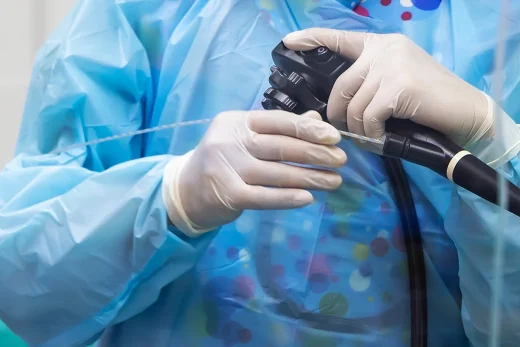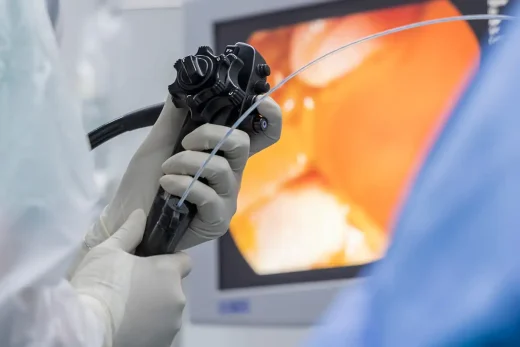ERCP in Turkey
Navigating Your Digestive Health with ERCP.
What is ERCP (Endoscopic Retrograde Cholangiopancreatography)?
Endoscopic Retrograde Cholangiopancreatography, commonly referred to as ERCP, is a specialized medical procedure used to diagnose and treat disorders of the bile ducts, gallbladder, and pancreas. It is typically performed by a gastroenterologist, a medical professional specializing in digestive system disorders, and involves the use of an endoscope, a flexible, lighted tube with a camera attached to its tip. During an ERCP, the endoscope is gently inserted through the patient's mouth, down the esophagus, and into the stomach and duodenum, where it reaches the ampulla of Vater, a small opening where the common bile duct and pancreatic duct meet.
One of the primary purposes of ERCP is to obtain detailed images of these ducts through the injection of contrast dye, allowing for the visualization of potential obstructions, stones, tumors, or other abnormalities. This imaging helps in the diagnosis of conditions like gallstones, pancreatitis, and bile duct strictures. Moreover, ERCP is not solely diagnostic; it also has a therapeutic component. Through the endoscope, doctors can perform procedures such as removing gallstones or placing stents to relieve obstructions in the bile ducts, thus addressing various conditions. ERCP is a valuable tool in the realm of gastroenterology, enabling both the diagnosis and treatment of a wide range of disorders affecting the biliary and pancreatic systems. It is considered a minimally invasive technique, which often means shorter recovery times and reduced patient discomfort compared to traditional surgical methods.

Who needs ERCP?
ERCP (Endoscopic Retrograde Cholangiopancreatography) is typically recommended for individuals who are experiencing specific medical conditions or symptoms related to the biliary and pancreatic systems.
Gallstones: ERCP is often used to diagnose and treat gallstones that have become lodged in the common bile duct, leading to symptoms like jaundice, abdominal pain, and pancreatitis.
Pancreatitis: When pancreatitis is caused by an obstruction in the pancreatic duct, ERCP can help identify and remove the obstruction, relieving the condition.
Biliary strictures: Narrowing of the bile ducts, whether due to scarring, tumors, or other causes, can be evaluated and treated during an ERCP procedure.
Cholangitis: This is a serious infection of the bile ducts, and ERCP can help identify the cause of the infection and provide drainage or stent placement for treatment.
Biliary or pancreatic tumors: ERCP can be used for diagnosis and in some cases, for the placement of stents to relieve obstructions caused by tumors.
Sphincter of Oddi dysfunction: In cases where the sphincter (muscle) controlling the flow of bile and pancreatic juices into the duodenum malfunctions, ERCP may be performed to assess and potentially treat this condition.
Bile duct or pancreatic duct leaks: ERCP can identify and sometimes repair leaks in these ducts.
Who applies ERCP?
This is performed by a specially trained medical specialist known as a gastroenterologist. Gastroenterologists are physicians who specialize in the diagnosis and treatment of disorders related to the digestive system, including the esophagus, stomach, intestines, liver, gallbladder, pancreas, and associated structures.

Before ERCP
Before undergoing an ERCP (Endoscopic Retrograde Cholangiopancreatography) procedure, several important steps and considerations are typically involved. First and foremost, a patient's symptoms and medical history are carefully evaluated by a healthcare provider, often a gastroenterologist, to determine the necessity of the procedure. In some cases, alternative diagnostic or therapeutic approaches may be considered. Once the decision to proceed with ERCP is made, informed consent is obtained from the patient, detailing the potential risks and benefits of the procedure.
In preparation for ERCP, patients are usually instructed to fast for a certain period of time, typically overnight, to ensure an empty stomach, which makes the procedure safer and more effective. Additionally, patients may be advised to discontinue the use of certain medications, especially blood-thinners, to reduce the risk of bleeding during or after the procedure. It is crucial to inform the healthcare team of any allergies, preexisting medical conditions, or recent illnesses, as these factors may influence the preparation and management of the ERCP. Patients can also expect to receive intravenous (IV) fluids and possibly antibiotics before the procedure to prevent infection.
In summary, ERCP preparation involves a thorough medical assessment, informed consent, fasting, medication adjustments, and clear communication with the healthcare team to ensure a safe and successful procedure. Proper preparation is vital to minimize risks and optimize the benefits of this specialized diagnostic and therapeutic technique.
After ERCP
After undergoing an ERCP (Endoscopic Retrograde Cholangiopancreatography) procedure, patients will typically go through a period of post-procedure care and recovery. Immediately following the ERCP, individuals may spend some time in a recovery area where their vital signs and overall condition are monitored. Patients can expect to have a sore throat or mild discomfort, which is a common side effect of the endoscope's passage through the throat. This discomfort should subside within a day or two. The healthcare team will provide guidance on when it's safe to resume eating, drinking, and taking any temporarily suspended medications. Patients should arrange for someone to drive them home since the sedatives used during the procedure can temporarily impair cognitive function.
It is essential to closely follow any post-ERCP instructions provided by the medical team, including managing potential side effects and monitoring for signs of complications, such as severe abdominal pain, fever, or unusual bleeding. In most cases, patients can resume their regular activities and diet within a day or two, but individual recovery times may vary based on the specific interventions performed during the ERCP.
Treatment Process
General
1-2 Hours
5 Days
1 Week
ERCP FAQ in Turkey
ERCP is performed to diagnose and treat conditions like gallstones, pancreatitis, bile duct obstructions, and tumors.
A flexible endoscope is passed through the mouth into the digestive system, allowing the physician to access the bile and pancreatic ducts.
ERCP is performed under sedation, so patients usually do not experience pain during the procedure.
ERCP typically takes 30 minutes to an hour, but it can vary depending on the complexity of the case.
Yes, patients are usually given sedation or anesthesia to make them comfortable during the procedure.
Most people can return to work within a day or two, but it depends on the individual and the nature of the procedure.
Contact Us
You can contact us to benefit from the various advantages and advanced health technology of Erdem Hospital, to ask all the questions you have in mind, and to benefit from our treatments.
Start to complete the form, let us reach you!
After you filled out the form, our health consultants will get touch in with you to understand your demands.
Please send your photos to health consultants, our doctors check them.
After all the processes are completed, your treatment will be planned according to the date you are available.